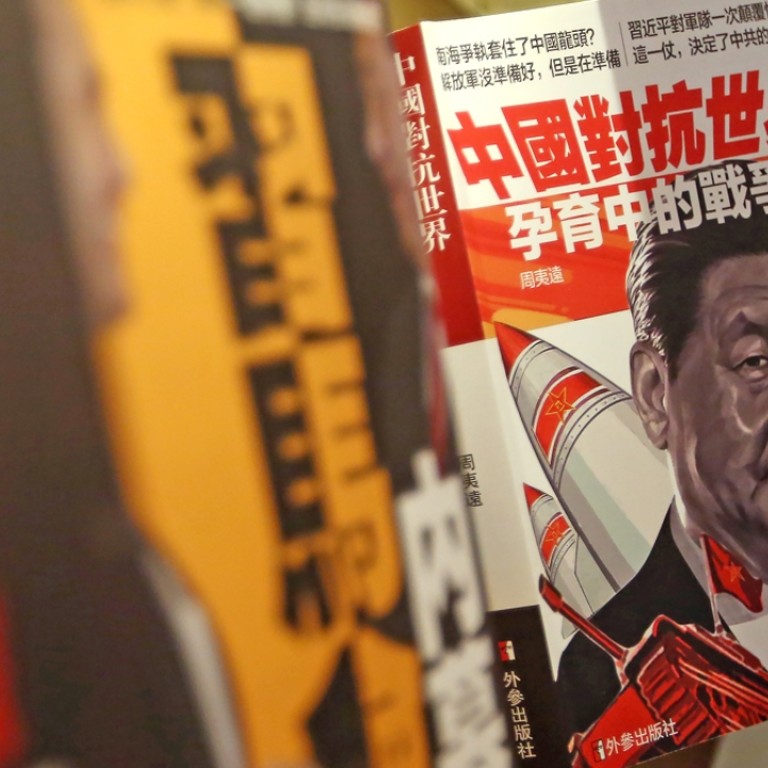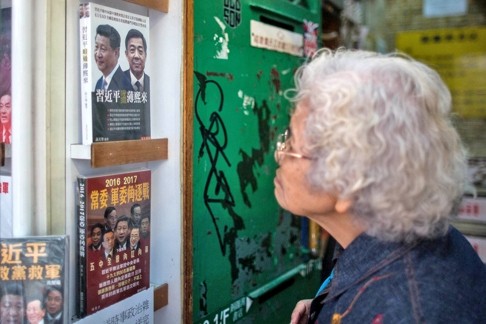
Hong Kong book stores pull titles banned in mainland China from shelves as mystery over missing bookseller deepens
Signs of jitters among local publishers as one major retail chain pulls banned books from shelves
Reading material banned on the mainland has been pulled from the shelves of at least one Hong Kong bookstore as the mystery over the disappearance of bookseller Lee Bo deepens.
English-language-focused Page One, which has a total of eight outlets in the city – six of them at Hong Kong International Airport – is understood to have begun withdrawing sensitive material from sale in late November, around the time the first of five men linked to Causeway Bay Books went missing.
The pulling of the books marks a small but potentially significant moment for what has become the lucrative business of selling sensational, page-turning books on China banned by Beijing.
READ MORE: Books banned in mainland China sell well in Taiwan, thanks to mainland visitors
When a South China Morning Post reporter posing as a customer approached Page One’s Tsim Sha Tsui store and asked for a book called The Secret Deals Between Xi Jinping and Bo Xilai, the salesman said the retailer had stopped selling banned books more than a month ago.
“We were told to take all politically sensitive books off the shelves in late November. The manager did not tell us the reason, but said Page One would no longer sell banned books ever again.”
Staff at the Kowloon Tong store and one of the airport outlets told the Post the same.
Page One did not respond to requests for comment by press time last night.

Page One Publishing, which mainly sells English-language titles, was set up in Singapore by Mark Tan in 1983.
The retailer expanded its business into the mainland in 2010 and has since opened six shops in Beijing, Hangzhou and Chengdu.
Banned books were often among the top selling items in Page One’s Hong Kong outlets and were placed in prominent areas at airport stores, from where mainland tourists would buy and smuggle them to elsewhere in the country.
The publishing of sensational books on the inner workings of the Communist Party and the private lives of government officials has brought lucrative returns for a number of booksellers.
The publisher at the centre of the ongoing mystery, Lee Bo, has reaped considerable profits from publishing anecdotal accounts on Chinese leaders long before the five shareholders disappeared in the past three months.
READ MORE: Well-wishers post notes on Hong Kong book shop after booksellers’ disappearances
“Lee’s first book was on the so-called new Shanghai gang. In it he exposed the corrupt party boss Chen Liangyu, and it became the first account on the subject and garnered a lot of interest,” said Jin Zhong, a local publisher, who is set to leave Hong Kong next month to join his family in the United States.
That book, he added, generated a profit of HK$1 million and became Lee’s first bucket of gold. It also set a trend of publishing titles covering the most up-to-date developments in Chinese politics.
“Unlike my books which could take months to produce a volume, the new publishers can do it in just a few days and hit the market on topics that are sensational and newsy,” he said.
“To them, money-making is the number one objective, that’s why they move fast and capitalise on personalities or subjects that are new in the market.”

The lucrative nature of the business reached new heights during the Bo Xilai case in 2012 when the ex-politburo member and Chongqing party chief was engulfed in an alleged power struggle on the eve of the 18th party congress. Bo’s subsequent downfall spurred sales of books on Chinese politics to mainland tourists in Hong Kong.
“Those were the good days when we sold up to 300 copies a day, which got us out of the red after our 13 years of running the bookstore,” said Paul Tang, the owner of People Book Cafe in Causeway Bay.
The surge in demand captured the attention of Gui Minhai, one of four partners in Lee’s book business who is said to be in custody in Shenzhen. Gui came to Hong Kong from Europe seeking to profit from the trade.
READ MORE: Missing Hong Kong bookseller ‘friendly, and not high-profile’: Lee Bo’s friends describe the man at the centre of the mystery
“Gui openly said he made HK$10 million just in 2013 alone,” Jin said. “With that money he bought houses and cars, and one of the properties is in Pattaya, where he was arrested.”
Jin’s publishing business has yielded less profit, but he too has over 40 banned titles, including the Chinese-language edition of Jung Chang’s Mao: The Unknown Story, from which he made HK$3 million, selling some 100,000 copies of the book over a period of 10 years.


